
- Select a language for the TTS:
- UK English Female
- UK English Male
- US English Female
- US English Male
- Australian Female
- Australian Male
- Language selected: (auto detect) - EN
Play all audios:
In the annals of the socialist falsification of history, the report by the Labour Party into its anti-Semitism crisis that led to key MPs leaving the party and to the humiliating defeat of
December 2019 will soon take pride of place. In 850 pages, the team that led Labour to the brink of near extinction whines and weaves its way through endless emails and WhatsApp exchanges to
prove that the problems relating to anti-Semitism were the exclusive fault of Labour Party staffers, and that it all happened long before the arrival of Jeremy Corbyn’s preferred new
general secretary in April 2018. The report, entitled “The work of the Labour Party’s Governance and Legal Unit in relation to antisemitism, 2014-2019” not only seeks to exonerate Corbyn and
his clique of Israel-haters but alleges that instead of dealing with anti-Semitism, the Labour Party bureaucracy was obsessed with ensuring Corbyn’s defeat in the 2017 election and his
removal as party leader. In an extraordinary attack on Iain (now Lord) McNicol, the previous general secretary, the report accuses him of having “falsely claimed to have processed all
antisemitism complaints” and having “falsely claimed that most antisemitism complaints the party received were not about Labour members.” The Labour Party office has, throughout history,
been divided between different political camps. In the 1920s, Herbert Morrison said the Labour Party should do more to investigate pro-Soviet tendencies. In the 1960s and 1970s, the left
worked hard to abolish the “proscribed list” of anti-Labour left outfits which were seeking to infiltrate Labour. They won that battle and the result was the take-over of parts of Labour by
the far left in the 1980s which kept Labour out of power for nearly two decades. The rise in Labour membership to 600,000 — 1 per cent of the population — after Ed Miliband reduced the
membership fee to £3 didn’t only bring in thousands of new young members angry with the five years of Tory-LibDem austerity ideology. It also brought back cynical older members who had left
the party after Labour had committed the ultimate crime for the far left: winning an election and forming a government in 1997. This included passionate haters of Israel, believers in global
Jewish conspiracies, supporters of terrorist resistance against Israel in the Middle East and anti-Jewish attacks like the murder of Jewish journalists in France. The responsibility for how
the Labour Party machine works lies with the party leader. The general secretary is appointed by the NEC but leaders can appoint their own choice as Tony Blair did. Corbyn and his allies
had control of the NEC and in due course did replace Iain McNicol early in 2018 with Jennie Formby. She was close to the Unite general secretary, Len McCluskey. The report alleges that party
officials “often openly worked against the aims and objectives of the leadership of the Party, and in the 2017 general election some key staff even appeared to work against the Party’s core
objective of winning elections.” This is an extraordinary allegation and shows how desperate the new party apparatus is to deflect any criticism of Corbyn and his advisors. For sure the
Labour Party — MPs, councillors, officials — were divided about Corbyn’s prospect of winning power and recalled his serial disloyalty to party policy and fellow MPs in previous years. But in
the end, the tone over anti-Semitism was set by Corbyn himself. He could have gone to Yad Vashem, the Holocaust Memorial in Israel, made clear that his support for Palestinian rights was
matched by an unqualified support for the right of Israel to exist in security and peace. Corbyn could have made clear that Labour’s sympathy with the Palestinian cause does not extend to
support for outfits linked to Jew-killing or Holocaust denial. He did no such thing. After McNichol was replaced in 2018, nothing changed. Jewish Labour MPs like Luciana Berger, Ruth Smeeth
and Margaret Hodge all said that Corbyn was doing nothing to support or protect them from anti-Semitic attacks in their constituencies and on social media. This culminated in good Labour MPs
leaving the party early in 2019 in protest partly at the tolerance of anti-Semitic statements. Top Labour lawyers like Lord Falconer QC and Gordon Nardell QC — a friend of Corbyn and Jewish
— refused to work in the Labour head office on anti-Semitism. In Falconer’s case he made clear that Labour had to be brutal and unforgiving on any allegation. The message was expel first,
investigate after. This may be against norms of natural justice but if Corbyn had adopted that approach then perhaps, just perhaps, Labour could have gone into the election with the
anti-Semitism allegation under some control. The opposite happened. The anti-Semitism poison worsened in 2018 and 2019 under Corbyn and Formby. The Chief Rabbi, Ephraim Mirvis, in an
extraordinary intervention by a faith leader, condemned Corbyn and Labour in the midst of the election. This reflected the despair in the Jewish community, especially its non-Tory elements,
that the years of Corbyn leadership had done nothing to deal with anti-Semitism. The 850-page report puffs and pants its way through emails and mobile messages but cannot wash away the
stain of anti-Semitism that did so much damage to Labour. The then party leader cannot hide behind this report. The buck stops with Corbyn.






